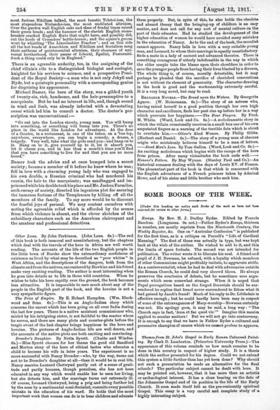Drender's Daughter. By Netta Syrett. (Chatto and Windus. 6s.)—Miss Syrett
chooses for her theme the good old Sandford and Merton story of the hero of ethical tastes who educates a child to become his wife in later years. The experiment is no more successful with Nancy Drender—who, by the way, turns out not to be Drender's daughter at all—than it would be in real life. Nancy marries Leonard Chetwynd partly out of a sense of grati- tude and partly because, though penniless, she has not been educated in any way which would enable her to earn her living, but she detests him, and the marriage turns out extremely ill. Of course, Leonard Chetwynd, being a prig and being further led by the nose by a sentimental semi-Socialist, commits every possible mistake in the education of his ward. He holds that the most important work that women can do is to bear children and educate
them properly. But, in spite of this, he also holds the obsolete and absurd theory that the bringing-up of children is an easy matter, and does not call for any sort of mental culture on the part of their educator. Had he studied the development of the higher education of women he would have avoided many mistakes in the education of Nancy. As to the end of the book, the moralist cannot approve. Nancy falls in love with a very suitable young man, and Leonard, to whom their marriage is equally unsatisfactory finds a math in a lady of earnest and advanced theories. There is something courageous if utterly indefensible in the way in which the elder couple take the blame upon their shoulders in order to save the younger people from having their lives blasted by a divorce, The whole thing is, of course, morally detestable, but it may perhaps be pleaded that the sacrifice of cherished conventions is not without its element of generosity. The character-drawing in the book is good and the workmanship extremely careful. It is a very long novel, but easy to read.


































 Previous page
Previous page